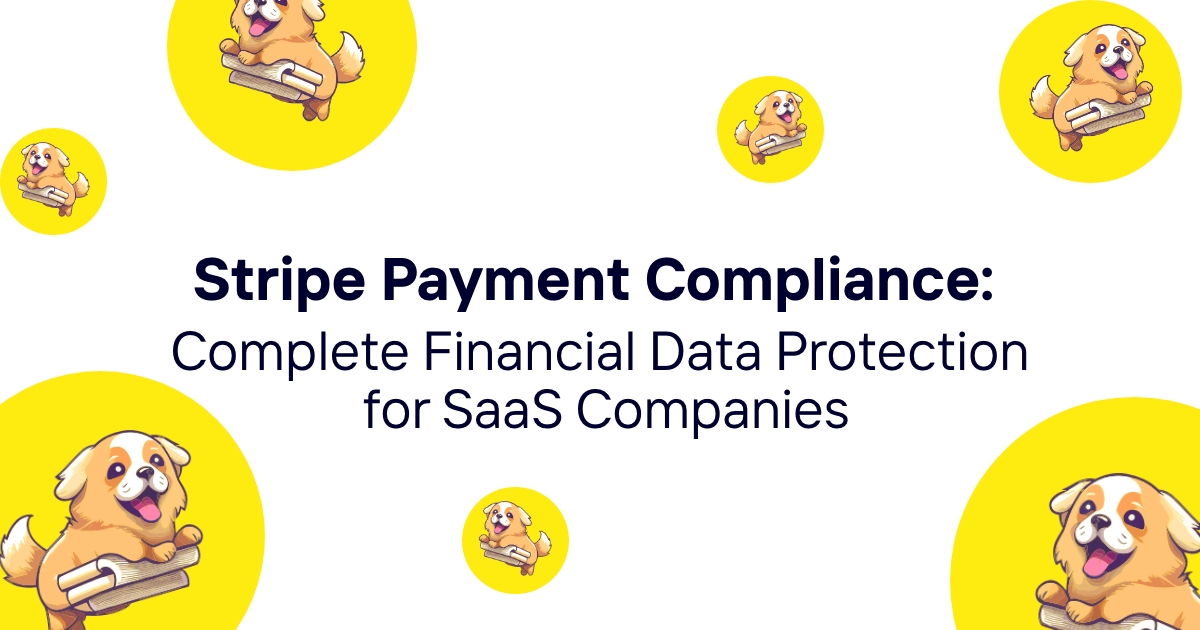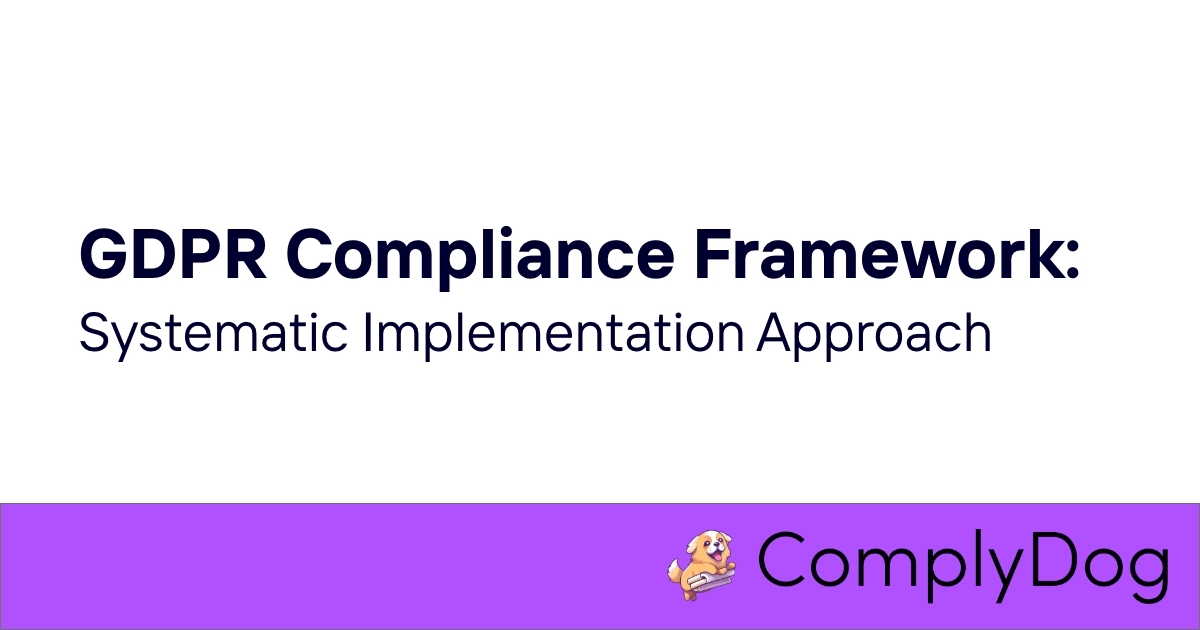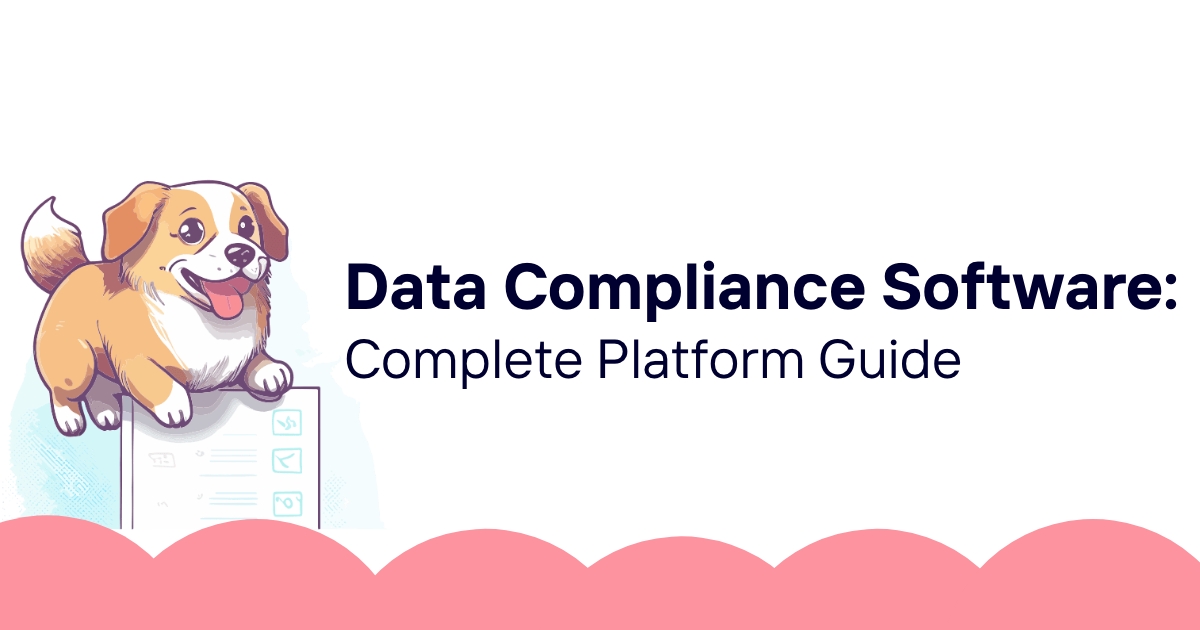Stripe's payment processing platform handles some of the most sensitive personal and financial data in SaaS operations, making privacy compliance absolutely critical for companies serving global markets. While Stripe provides robust security and compliance features, SaaS companies must understand how to implement comprehensive data protection that addresses both payment industry requirements and privacy regulations.
The complexity of Stripe compliance lies in coordinating multiple regulatory frameworks including GDPR for personal data protection, PCI DSS for payment security, and various financial regulations that apply to different markets and transaction types. Each framework has distinct requirements that must work together harmoniously.
Stripe processes extensive customer data beyond payment information including billing addresses, email addresses, subscription preferences, and transaction history that creates comprehensive privacy obligations under regulations like GDPR, CCPA, and other international privacy laws.
SaaS companies using Stripe must navigate the intersection of payment processing, customer relationship management, and privacy compliance while maintaining seamless user experiences and operational efficiency that support business growth and customer satisfaction.
Proper Stripe privacy implementation requires understanding data flows between Stripe, your application, and third-party services while ensuring appropriate consent management, data subject rights support, and security controls throughout the payment ecosystem.
ComplyDog helps SaaS companies implement comprehensive Stripe privacy compliance through systematic assessment of payment data flows, automated compliance monitoring, and integrated privacy management that addresses the unique challenges of financial data protection.
Stripe Privacy and Data Protection Features
Stripe provides extensive privacy and data protection capabilities that SaaS companies must configure and implement appropriately to achieve comprehensive compliance across payment processing operations.
Stripe Data Processing Addendum:
Stripe provides comprehensive Data Processing Addendum (DPA) that defines roles, responsibilities, and compliance obligations for personal data processing through the Stripe platform under GDPR and other privacy regulations.
Review Stripe's DPA carefully to understand how it addresses your specific use cases while ensuring your implementation aligns with the processing purposes and safeguards outlined in the agreement.
Data Retention and Deletion:
Stripe implements data retention policies that balance regulatory requirements, business needs, and privacy protection while providing mechanisms for coordinating customer data deletion with SaaS application requirements.
Configure data retention that aligns with your privacy policies and customer expectations while understanding how Stripe's retention practices affect your ability to respond to data subject deletion requests.
International Data Transfers:
Stripe processes payments globally and provides appropriate safeguards for international data transfers including standard contractual clauses and compliance with adequacy decisions that support cross-border payment processing.
Document international data transfer arrangements with Stripe while ensuring appropriate privacy disclosures about where customer payment data might be processed during transaction settlement.
Encryption and Security Measures:
Stripe implements comprehensive security measures including encryption at rest and in transit, tokenization, and network security controls that protect payment data throughout processing lifecycles.
Understand Stripe's security architecture while implementing appropriate security measures in your application to maintain end-to-end protection for customer payment and personal data.
Audit and Compliance Certifications:
Stripe maintains various compliance certifications including PCI DSS Level 1, SOC 2 Type II, and ISO 27001 that demonstrate commitment to security and privacy protection for payment processing.
Leverage Stripe's compliance certifications to support your own compliance documentation while ensuring your implementation doesn't compromise the security controls that enable these certifications.
For insights on managing payment data alongside other customer information, check out our HubSpot GDPR compliance guide which addresses similar integrated privacy challenges.
Payment Data Processing and GDPR Compliance
Payment processing through Stripe involves extensive personal data handling that requires careful GDPR compliance management while maintaining efficient payment operations and customer experience.
Payment Data Classification:
Stripe processes various types of data that receive different privacy protection including payment card information covered by PCI DSS, billing information protected by GDPR, and transaction metadata that might constitute personal data.
Classify all data processed through Stripe appropriately while implementing corresponding protection measures and privacy disclosures that address different data categories and their specific requirements.
Legal Basis for Payment Processing:
Payment processing typically relies on contract performance as legal basis under GDPR, but related activities like fraud prevention, customer analytics, and marketing might require different legal basis or explicit consent.
Document legal basis clearly for all payment-related processing activities while ensuring customers understand how payment data supports different business functions beyond transaction completion.
Payment Data Minimization:
Implement data minimization practices that collect only payment information necessary for transaction processing while avoiding unnecessary data gathering that creates privacy risks without corresponding business value.
Audit payment data collection to ensure all information serves specific business purposes while considering whether payment analytics and customer insights require additional consent or privacy protection.
Customer Communication About Payment Data:
Provide clear privacy notices that explain payment data processing including collection purposes, retention periods, sharing with payment networks, and customer rights regarding payment information.
Design payment privacy communication that builds customer confidence while providing legally required information about payment data processing in accessible and understandable language.
Cross-Border Payment Privacy:
International payment processing involves data transfers to banks, payment networks, and regulatory authorities that must comply with GDPR transfer requirements while supporting global commerce.
Document international payment data flows while ensuring appropriate privacy disclosures about cross-border processing that occurs during payment settlement and regulatory compliance.
Customer Payment Information Management
Effective customer payment information management requires balancing comprehensive payment processing capabilities with privacy protection that respects individual rights and regulatory requirements.
Customer Payment Methods Storage:
Stripe's secure vault stores payment methods using tokenization that reduces PCI DSS scope while enabling subscription billing and repeat purchases that require ongoing payment information access.
Implement payment method storage that provides customer convenience while ensuring appropriate security controls and privacy protection for stored payment information throughout its lifecycle.
Billing Information Privacy:
Billing addresses, contact information, and customer identifiers used for payment processing constitute personal data requiring GDPR protection while supporting payment verification and fraud prevention.
Manage billing information with appropriate privacy controls while ensuring payment processing functionality and fraud prevention capabilities that protect both customers and business operations.
Payment History and Analytics:
Transaction history and payment analytics provide valuable business insights but involve personal data processing that requires privacy consideration and appropriate consent or legal basis.
Implement payment analytics that balance business intelligence needs with privacy protection while considering whether detailed transaction analysis requires explicit consent beyond payment processing.
Customer Payment Preferences:
Payment method preferences, billing frequencies, and payment communication settings constitute personal data that requires privacy protection while supporting customer service and account management.
Design preference management that provides customer control over payment-related communications while supporting necessary payment processing notifications and account management functions.
Payment Dispute and Refund Data:
Payment disputes, chargebacks, and refund processes involve extensive personal data exchange with payment networks and banks that must comply with privacy regulations while supporting dispute resolution.
Manage dispute data with appropriate privacy controls while ensuring necessary information sharing with payment networks and maintaining customer communication throughout dispute resolution processes.
Stripe Webhook and API Privacy Considerations
Stripe webhooks and APIs create data processing touchpoints that require privacy consideration to ensure personal data protection throughout payment processing integrations and business logic implementations.
Webhook Data Privacy Protection:
Stripe webhooks transmit event data including personal information that requires secure handling, appropriate access controls, and privacy protection throughout webhook processing workflows.
Implement webhook security that protects personal data during transmission and processing while ensuring webhook handlers respect privacy requirements and data processing limitations.
API Data Access Controls:
Stripe API access controls determine what payment and customer data your application can retrieve, requiring careful permission management that aligns with privacy policies and data processing purposes.
Configure API permissions that provide necessary functionality while limiting data access to what's required for specific business purposes outlined in privacy notices and consent mechanisms.
Custom Payment Flows Privacy:
Custom payment integrations using Stripe APIs must maintain privacy compliance while providing unique payment experiences that differentiate your SaaS offering and support business requirements.
Design custom payment flows that collect only necessary information while providing appropriate privacy notices and consent mechanisms for any data processing beyond basic payment completion.
Third-Party Integration Data Sharing:
Stripe integrations with accounting systems, customer service platforms, and analytics tools involve personal data sharing that requires privacy assessment and appropriate data processing agreements.
Audit all Stripe integrations for privacy compliance while ensuring data sharing serves legitimate business purposes and aligns with customer expectations about payment data usage.
Development and Testing Data Protection:
Stripe test environments and development integrations must protect any personal data used for testing while supporting development activities through appropriate data anonymization and access controls.
Implement development data protection that prevents unauthorized access to personal information while supporting payment integration development and testing through privacy-preserving techniques.
PCI DSS and GDPR Integration with Stripe
Coordinating PCI DSS payment security requirements with GDPR privacy obligations requires understanding how these frameworks complement and interact throughout payment processing operations.
Dual Compliance Framework:
PCI DSS protects payment card data while GDPR protects all personal data, creating overlapping but distinct compliance obligations that must be coordinated without creating conflicting requirements.
Implement compliance frameworks that address both standards efficiently while ensuring payment security measures support rather than conflict with privacy protection requirements.
Data Security Integration:
Stripe's PCI DSS compliance provides payment card security while GDPR requires broader personal data protection including billing information, customer identifiers, and payment preferences.
Design security measures that exceed both frameworks' requirements while ensuring comprehensive protection for all personal and payment data throughout processing and storage lifecycles.
Access Control Coordination:
PCI DSS requires specific access controls for payment card environments while GDPR requires appropriate access controls for all personal data, creating coordinated but potentially different control requirements.
Implement access controls that satisfy both frameworks while maintaining operational efficiency and ensuring appropriate personnel have necessary access to support customer service and business operations.
Audit and Monitoring Integration:
Both frameworks require comprehensive audit logging and monitoring, creating opportunities for integrated compliance monitoring that addresses payment security and privacy protection through unified approaches.
Design audit and monitoring that provides comprehensive coverage while supporting both PCI DSS and GDPR compliance demonstration through efficient logging and reporting mechanisms.
Incident Response Coordination:
Payment security incidents might also constitute privacy breaches, requiring coordinated incident response that addresses both PCI DSS notification requirements and GDPR breach notification timelines.
Develop incident response procedures that coordinate payment security response with privacy breach management while ensuring appropriate stakeholder notification and regulatory compliance.
Subscription Billing Privacy in Stripe
Subscription billing through Stripe creates ongoing customer relationships that require comprehensive privacy management throughout subscription lifecycles including signup, billing, changes, and cancellation.
Subscription Data Collection Privacy:
Subscription services often collect extensive customer information beyond payment details including usage data, preference information, and account metadata that requires privacy protection and clear consent.
Implement subscription data collection that serves specific business purposes while avoiding unnecessary information gathering that creates privacy risks without corresponding customer value or business need.
Recurring Billing Consent:
Recurring subscription charges require appropriate customer consent and clear communication about billing terms while maintaining privacy compliance for ongoing payment processing and customer management.
Design subscription consent that provides clear information about recurring charges while ensuring ongoing payment processing maintains appropriate legal basis and customer communication throughout subscription periods.
Subscription Analytics Privacy:
Subscription analytics including churn prediction, usage analysis, and customer segmentation process personal data extensively, requiring privacy consideration and appropriate consent or legal basis.
Implement subscription analytics that balance business intelligence needs with privacy protection while considering whether detailed customer profiling requires explicit consent beyond subscription management.
Subscription Preference Management:
Subscription preferences including billing frequency, communication settings, and service options constitute personal data that requires privacy protection while supporting customer account management.
Design preference management that provides customer control while supporting subscription service delivery through appropriate data processing and communication aligned with customer choices.
Subscription Cancellation Privacy:
Subscription cancellation processes must respect customer data deletion rights while maintaining necessary records for business operations, dispute resolution, and regulatory compliance requirements.
Implement cancellation procedures that provide appropriate data deletion while preserving necessary information for legitimate business purposes through clear retention policies and customer communication.
Stripe Compliance Monitoring and Reporting
Comprehensive compliance monitoring for Stripe payment processing requires systematic tracking of privacy metrics, security performance, and regulatory compliance across payment operations and customer interactions.
Payment Privacy Metrics Tracking:
Monitor key privacy metrics including consent rates, data subject request processing, customer preference management, and privacy policy compliance across all payment-related customer interactions.
Implement privacy metrics tracking that provides operational insights while supporting compliance demonstration and continuous improvement in payment privacy protection practices.
Security and Compliance Dashboard:
Create comprehensive dashboards that track both payment security and privacy compliance metrics while providing unified views of compliance performance across regulatory frameworks.
Design compliance dashboards that support decision-making while providing necessary visibility for regulatory reporting and internal governance oversight of payment operations.
Automated Compliance Reporting:
Implement automated reporting that tracks privacy compliance metrics for payment operations while reducing manual effort and ensuring consistent documentation for regulatory accountability.
Configure automated reporting that addresses both payment security and privacy requirements while providing comprehensive compliance documentation for regulatory inquiries and internal assessment.
Customer Privacy Rights Monitoring:
Track data subject rights processing for payment-related requests while ensuring comprehensive coverage of customer requests and timely responses that meet regulatory timeline requirements.
Implement rights monitoring that provides visibility into privacy request processing while supporting continuous improvement in customer service and privacy protection practices.
Integration Compliance Assessment:
Regularly assess privacy compliance for all Stripe integrations while ensuring ongoing compliance as business processes and technical integrations evolve over time.
Design integration assessment procedures that identify privacy risks proactively while supporting business development through privacy-compliant integration practices and vendor management.
Regulatory Change Impact Assessment:
Monitor regulatory developments that affect payment privacy compliance while assessing impact on Stripe implementation and business operations that support customer payment processing.
Implement regulatory monitoring that provides proactive assessment of compliance requirements while supporting business adaptation to changing privacy and payment security regulations.
Ready to achieve comprehensive payment privacy compliance? Use ComplyDog and transform Stripe payment processing into a privacy-protected competitive advantage through systematic compliance management that addresses the intersection of payment security and privacy protection requirements.


















